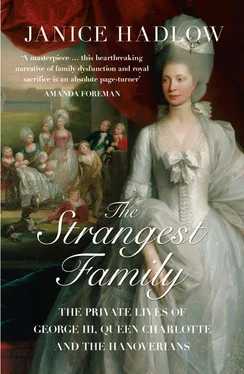Those who found themselves on the receiving end of his grandfather’s insensitivity aroused the sympathy of the Prince of Wales. ‘It was at that moment the young prince … was struck with admiration and pity; feelings that ripened into an attachment which never left him until the day of his death.’ 119That was the account Sarah gave to her son in 1837, and which he transcribed with reverential filial piety. In letters she wrote to her sisters at the time, Sarah was not so sentimental. After her first meeting with George, she described her clothes – blue and black feathers, black silk gown and cream lace ruffles – with far more detail than her encounter with the prince. She hardly spoke to him at all. Too shy to approach her directly, the prince had instead approached her older sister Caroline, stumbling out unaccustomed praises of her beauty and charm.
George was not the only man to find Sarah Lennox mesmerisingly attractive. It was hard to pin down the exact nature of her appeal, which was not always apparent at first sight. Her sisters failed to understand it at all. ‘To my taste,’ wrote Emily, ‘Sarah is merely a pretty, lively looking girl and that is all. She has not one good feature … her face is so little and squeezed, which never turns out pretty.’ 120Her brother-in-law Henry Fox thought otherwise. ‘Her beauty is not easily described,’ he wrote, ‘otherwise than by saying that she had the finest complexion, the most beautiful hair, and prettiest person that was ever seen, with a sprightly and fine air, a pretty mouth, remarkably fine teeth, and an excess of bloom in her cheeks, little eyes – but that is not describing her, for her great beauty was a peculiarity of countenance that made her at the same time different from and prettier than any other girl I ever saw.’ 121Horace Walpole saw her once as she acted in amateur theatricals at Holland House; his detached connoisseur’s eye caught something of her intense erotic promise: ‘When Lady Sarah was all in white, with her hair about her ears and on the ground, no Magdalen by Caravaggio was half so lovely and expressive.’ 122Sarah, unfazed by the comparison to a fallen woman, declared its author ‘charming’. She liked Walpole, she said with disarming honesty, because he liked her.
This cheerful willingness to find good in all those who found good in her no doubt smoothed her encounters with the awkward Prince of Wales. They met at formal Drawing Rooms and private balls, and George’s attention was so marked that it was soon noticed by the sharp-eyed Henry Fox. At this point, he did not take it seriously; it was no more than an opportunity for a good tease. ‘Mr Fox says [George] is in love with me, and diverts himself extremely,’ Sarah told Emily wryly. 123
Bute, however, knew that George’s feelings were anything but a joke. Having declared them to his mentor, George was now desperate to know whether Sarah Lennox could be considered a suitable candidate for marriage. It seems never to have occurred to him that this was a decision he might make for himself. He submitted himself absolutely to Bute’s judgement, assuring him that no matter what the earl concluded, he would abide by his decision. He hoped for a favourable answer, but insisted that their relationship would not be affected if it were not so: ‘If I must either lose my friend or my love, I shall give up the latter, for I esteem your friendship above all earthly joy.’ 124The rational part of him must have known what Bute’s answer would be. It was inconceivable that he should marry anyone but a Protestant foreign princess; an alliance between the royal house and an English aristocratic family would overthrow the complex balance of political power on which the mechanics of the constitutional settlement depended.
To marry into a family that included Henry Fox was, if possible, even more outrageously improbable. Henry was the brother of Stephen Fox, the lover of Lord Hervey, the laconic Ste, who had been driven into a jealous fury by the ambiguous relationship between Hervey and Prince Frederick. Henry Fox was one of the most controversial politicians of his day: able, amoral and considered spectacularly corrupt, even by the relaxed standards of eighteenth-century governmental probity. A man described by the Corporation of the City of London as a ‘public defaulter of unaccounted millions’ was unlikely to prove a suitable brother-in-law to the heir to the throne. Bute’s judgement was therefore as unsurprising as it was uncompromising: ‘God knows, my dear sir, I with the utmost grief tell it you, the case admits of not the smallest doubt.’ He urged George to consider ‘who you are, what is your birthright, what you wish to be’. If he examined his heart, he would understand why the thing he hoped for could never happen. The prince declared himself reluctantly persuaded that Bute was right. ‘I have now more obligations to him than ever; he has thoroughly convinced me of the impossibility of ever marrying a countrywoman.’ He had been recalled to a proper sense of duty. ‘The interest of my country shall ever be my first care, my own inclinations shall ever submit to it; I am born for the happiness or misery of a great nation, and consequently must often act contrary to my passions.’ 125
George’s renunciation was made easier by the fact that he did not see the object of his passion for some months. The next time he did so, he was no longer Prince of Wales but king. George II died in October 1760; Sarah Lennox went to court in 1761, when all the talk was of the impending coronation. As soon as he saw her again, all George’s hard-won resolution ebbed away, as ‘the boiling youth’ in him made him forget all the promises he had made to Bute. Despite his undertaking to give her up, he took the unprecedented step of declaring to her best friend the unchanged nature of his feelings for Sarah. One night at court, he cornered Lady Susan Fox-Strangways, another member of the extensive Fox clan. The conversation that followed was so extraordinary that Lady Susan repeated it to Henry Fox, who transcribed it. The king asked Lady Susan if she would not like to see a coronation. She replied that she would.
K: Won’t it be a finer sight when there is a queen?
LS: To be sure, sir.
K: I have had a great many applications from abroad, but I don’t like them. I have had none at home. I should like that better.
LS: (Nothing, frightened)
K: What do you think of your friend? You know who I mean; don’t you think her fittest?
LS: Think, sir?
K: I think none so fit.
Fox then said that George ‘went across the room to Lady Sarah, and bid her ask her friend what he had been saying and make her tell her all’. 126
The fifteen-year-old Sarah, never very impressed by George’s attentions, had been conducting a freelance flirtation of her own, which had just come to an end, and she was in no mood to be polite to other suitors, even royal ones. When George approached her at court soon after, she rebuffed all his attempts to discuss the conversation he had had with Lady Susan. When he asked whether she had spoken to her friend, she replied monosyllabically that she had. Did she approve of what she had heard? Fox reported that ‘She made no answer, but looked as cross as she could. HM affronted, left her, seemed confused, and left the Drawing Room.’ 127
Fox worked away, trying to discover the true state of George’s feelings for Lady Sarah. Despite the unfortunate snub, they seemed to Fox as strong as ever. He was less certain, however, of where they might lead. Fox told his wife that he was not sure whether George really intended to marry her, adding that ‘whether Lady Sarah shall be told of what I am sure of, I leave to the reader’s discretion’. 128If a crown was out of the question, it might be worth Sarah settling for the role of royal mistress. At the Birthday Ball a few months later, Fox’s hopes of the ultimate prize revived once more. ‘He had no eyes but for her, and hardly talked to anyone else … all eyes were fixed on them, and the next morning all tongues observing on the particularity of his behaviour.’ 129But after over a year of encouraging signals, there was still no sign of any meaningful declaration from the king. Determined to bring matters to a head, Lady Sarah was sent back to court with very precise instructions to do all she could to extract from her vague suitor some concrete sense of his intentions. As she explained to Lady Susan, Fox had coached her to perfection: ‘I must pluck up my spirits, and if I am asked if I have thought of … or if I approve of … I am to look him in the face and with an earnest but good-humoured countenance, say “that I don’t know what I ought to think”. If the meaning is explained, I must say “that I can hardly believe it” and so forth.’ It was all very demanding. ‘In short, I must show I wish it to be explained, without seeming to suggest any other meaning; what a task it is. God send that I may be enabled to go through with it. I am allowed to mutter a little, provided that the words astonished , surprised , understand and meaning are heard.’ 130
Читать дальше












